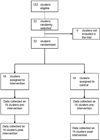Evidence-based discussion increases childhood vaccination uptake: a randomised cluster controlled trial of knowledge translation in Pakistan
- PMID: 19828066
- PMCID: PMC3226240
- DOI: 10.1186/1472-698X-9-S1-S8
Evidence-based discussion increases childhood vaccination uptake: a randomised cluster controlled trial of knowledge translation in Pakistan
Abstract
Background: Childhood vaccination rates are low in Lasbela, one of the poorest districts in Pakistan's Balochistan province. This randomised cluster controlled trial tested the effect on uptake of informed discussion of vaccination costs and benefits, without relying on improved health services.
Methods: Following a baseline survey of randomly selected representative census enumeration areas, a computer generated random number sequence assigned 18 intervention and 14 control clusters. The intervention comprised three structured discussions separately with male and female groups in each cluster. The first discussion shared findings about vaccine uptake from the baseline study; the second focussed on the costs and benefits of childhood vaccination; the third focussed on local action plans. Field teams encouraged the group participants to spread the dialogue to households in their communities. Both intervention and control clusters received a district-wide health promotion programme emphasizing household hygiene. Interviewers in the household surveys were blind of intervention status of different clusters. A follow-up survey after one year measured impact of the intervention on uptake of measles and full DPT vaccinations of children aged 12-23 months, as reported by the mother or caregiver.
Results: In the follow-up survey, measles and DPT vaccination uptake among children aged 12-23 months (536 in intervention clusters, 422 in control clusters) was significantly higher in intervention than in control clusters, where uptake fell over the intervention period. Adjusting for baseline differences between intervention and control clusters with generalized estimating equations, the intervention doubled the odds of measles vaccination in the intervention communities (OR 2.20, 95% CI 1.24-3.88). It trebled the odds of full DPT vaccination (OR 3.36, 95% CI 2.03-5.56).
Conclusion: The relatively low cost knowledge translation intervention significantly increased vaccine uptake, without relying on improved services, in a poor district with limited access to services. This could have wide relevance in increasing coverage in developing countries.
Trial registration: ISRCTN12421731.
Figures
References
-
- UNICEF/WHO. Immunization summary. A statistical reference containing data through 2005. UNICEF New York; 2007. http://www.unicef.org/publications/files/Immunization_Summary_2007.pdf (accessed 28 May 2009)
-
- Government of Pakistan. Pakistan Social and Living Standards Measurement Survey (PSLM) 2006-07. Government of Pakistan, Federal Bureau of Statistics, Islamabad; 2007.
LinkOut - more resources
Full Text Sources



